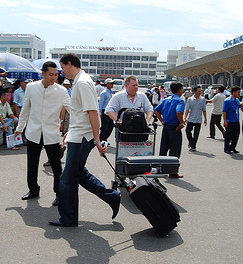
Onyx Hospitality Group has spent recent years taking its corporate culture across borders through a comprehensive HR strategy.
Onyx Hospitality Group has over 4,000 employees in several countries, including China, Thailand, Hong Kong and the Maldives. It has grown considerably since 2008, partly by leveraging on a unique strategy of employee development. In effect, Onyx creates a cohesive organization by marketing the hotel brand to its own employees.
The Nation‘s Pichaya Changsorn recently interviewed Onyx’s head of personnel, Suresh Menon, regarding the group’s HR strategy.
Said Menon:
We’re talking about our staff being our ’internal customers’, so we need to ’market’; to promote ourselves and manage our staff. We call them our ’team members […] Inform, engage and recognise are the three key words. In doing that, we make sure that we maintain the brand as well, so that staff understand what Onyx is, as a company.

Linda Janssen is an American expat living in The Netherlands. She blogs at adventuresinexpatland.com.
Generally defined, emotional resilience is the psychological ability to adapt to the significant challenges, misfortunes and major set-backs that life throws our way. It allows us to either maintain or return to a positive view of life after turmoil.
I’ve come to believe that fostering emotional resilience is important for everyone, but is absolutely essential for those living overseas.
Expats who are not emotionally resilient may face a number of challenges, a range of potential risks that include alienation and even depression. Here I offer a slew of tips in four broad categories that can help expats bolster their emotional resilience. These include making personal connections, communicating, visualizing positive outcomes and being optimistic.

There are many reasons expats choose to return home. Often they are related to personal relationships.
Despite the rewards of expat life, a majority of expats return to their country of origin eventually. This certainly isn’t true of everyone, but definitely to the extent that an expatriate lifestyle is often a temporary affair. Looking at the reasons expats return home provides some insight into the challenges of building a new life abroad.
Common reasons expats return home
Assignments end. Many expats are abroad on international assignments, and have no intention of staying forever. In and of itself this isn’t awful–just a fact of life. But since expats tend to befriend one another (as opposed to locals), this means their social groups change frequently, adding to the emotional tumult of expat life.
To be with friends and family. Many expats find themselves many thousands of miles away from their closest friends and family members. This can leave them feeling quite alone at times, particularly given the ever-changing nature of expat communities. Some expats feel pressure to return to care for aging or ill family members. Others simply decide it’s time to “put down roots.”

Linda Janssen is an American expat living in The Netherlands. She blogs at adventuresinexpatland.com
Generally defined, emotional resilience (ER) is the psychological ability to adapt to the significant challenges, misfortunes and major set-backs that life throws our way while being able to maintain or return to a positive view of oneself during and after such turmoil. I’ve come to believe that fostering our emotional resilience is important for everyone, but becomes absolutely essential to those living overseas.
For the most part, gone are the languid, slow-paced days of the expatriate life of the past. Life today in this globally interconnected, cross-cultural world is fast, frenetic and highly mobile. More and more, people choose to head overseas for employment, experience, education, better standard of living, adventure and wanderlust. Sometimes the choice is made for them, as in the case of economic downturn, corporate restructuring, downsizing and organizational reassignment.

As a recent survery shows, the Middle Eastern office can be a bundle of contradictions
Nearly 70% of women surveyed by Middle East job portal Bayt.com said they were treated equally with men by their employers, with only 15% saying they were treated unfairly. Aided by research specialists from YouGov, Bayt.com surveyed 2,347 women across 13 Middle East and North African countries, including a mix of locals and expats. The questions focused on women’s satisfaction in the workplace, particularly on their experiences relative to their male co-workers.
Despite a broad feeling of equality, over half the respondents said they make less than their spouses and a third that they had less chance of being promoted than their male co-workers (in GCC countries such as Saudi Arabia and the UAE this figure was around 50%). 25% of women said their maternity benefits were inadequate, with about the same number citing maternity leave periods of three months or less.

Berkeley's course for expat spouses had 25 attendees from 20 countries
The University of Berkeley, California, took steps to support expat spouses by creating a class called “Creating a Fulfilling Life in America,” available to spouses of international scholars, postdocs, students and researchers.
The six-week course focuses on issues such as dealing with culture shock, making American friends and managing stress. Each class session concludes with an hour long catered lunch, giving the expats an opportunity to share their experiences and connect with their classmates. Roibín Ó hÉochaidh explored the program in detail for the Berkeley NewsCenter, interviewing both participants and administrators.
 Bahrain will soon boast a one-of-a-kind European Expat Council, writes Trade Arabia. The Council will have direct access to government officials, allowing expats to voice feedback on everything from state welfare programs to immigration requirements in the Gulf kingdom. Bahrain’s King Hamad decided to form the council last month following a reception for expats at the Al Rawdah Palace. The Council is currently headed by a steering committee–officer elections are scheduled to take place before the end of 2011.
Bahrain will soon boast a one-of-a-kind European Expat Council, writes Trade Arabia. The Council will have direct access to government officials, allowing expats to voice feedback on everything from state welfare programs to immigration requirements in the Gulf kingdom. Bahrain’s King Hamad decided to form the council last month following a reception for expats at the Al Rawdah Palace. The Council is currently headed by a steering committee–officer elections are scheduled to take place before the end of 2011.
European expats’ main concerns in Bahrain revolve around travel bans, residency renewal and problems negotiating government bureaucracy (especially for business owners).
Adapting Abroad is for people moving abroad to work and professionals in the relocation industry, helping expats and HR staff with
- relocation news
- employee management
- tips on adjusting to life abroad
- expat employment trends